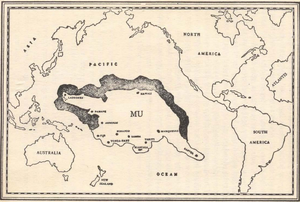Mu
| Mu | |||||
|---|---|---|---|---|---|
| Japanese Name | ムー | ||||
| Race | God | ||||
| Nationality | |||||
Under Construction
Profile
Super Ancient Demon Lord Mu is a primary antagonist debuted in Knights Template's Glorious Collapse, the Goddess of Chaos that is one of the six pieces of the Goddess St. Iris, and has fought Conductor's team in a 8-bit JRPG video game universe of her own creation in Verforet. She was only be able to be defeated because of the very own JRPG game rules she has set.
Event Stories
Trivia
- Mu's name origin is the lost continent of Mu. Author H. P. Lovecraft (1890–1937) featured the lost continent in his revision of Hazel Heald's short story "Out of the Aeons" (1935). Mu appears in numerous Cthulhu mythos stories, including many written by Lin Carter.
- Mu appears to be be a loose inspiration to the fallen angel Lucifer. Christianity does not exist as confirmed by Dr. Gloria's (a character said to be from real life Earth) observations over the religions in the Iris Cloud universe, but the closest equivalent can be found in St. Iris - a largely monotheistic country worshipping the only Goddess St. Iris, and it was said that St. Iris split herself into six parts to protect five countries and nature itself. Mu, unhappy with her realm, became the Goddess of Chaos.
- Mu's design resembles Ilulu of the Miss Kobayashi's Dragon Maid series, a character from the Chaos Dragons faction.
Counterpart
Mu is a lost continent introduced by Augustus Le Plongeon (1825–1908), who identified the "Land of Mu" with Atlantis. The name was subsequently identified with the hypothetical land of Lemuria by James Churchward (1851–1936), who asserted that it was located in the Pacific Ocean before its destruction.[1] The place of Mu in both pseudoscience and fantasy fiction is discussed in detail in Lost Continents (1954, 1970) by L. Sprague de Camp.
Geologists dismiss the existence of Mu and the lost continent of Atlantis as physically impossible, as a continent can neither sink nor be destroyed in the short period of time asserted in legends and folklore and literature about these places. Mu's existence has no factual basis.
The mythical idea of the "Land of Mu" first appeared in the works of the British-American antiquarian Augustus Le Plongeon (1825–1908), after his investigations of the Maya ruins in Yucatán. He claimed that he had translated the first copies of the Popol Vuh, the sacred book of the K'iche' from the ancient Mayan using Spanish.[7] He claimed the civilization of Yucatán was older than those of Greece and Egypt, and told the story of an even older continent.
Le Plongeon got the name "Mu" from Charles Étienne Brasseur de Bourbourg, who, in 1864, mistranslated what was then called the Troano Codex (now called "Madrid Codex") using the de Landa alphabet. Brasseur believed that a word which he read as Mu referred to a land that had been submerged by a catastrophe. Le Plongeon identified this lost land with Atlantis and, following Ignatius Donnelly in Atlantis: The Antediluvian World (1882), identified it as a continent that had once existed in the Atlantic Ocean.
Gallery
- Pages using Tabber parser tag
- Pages using DynamicPageList3 parser tag
- God
- Verforet
- Non-Playable Characters
- Fictional Location






